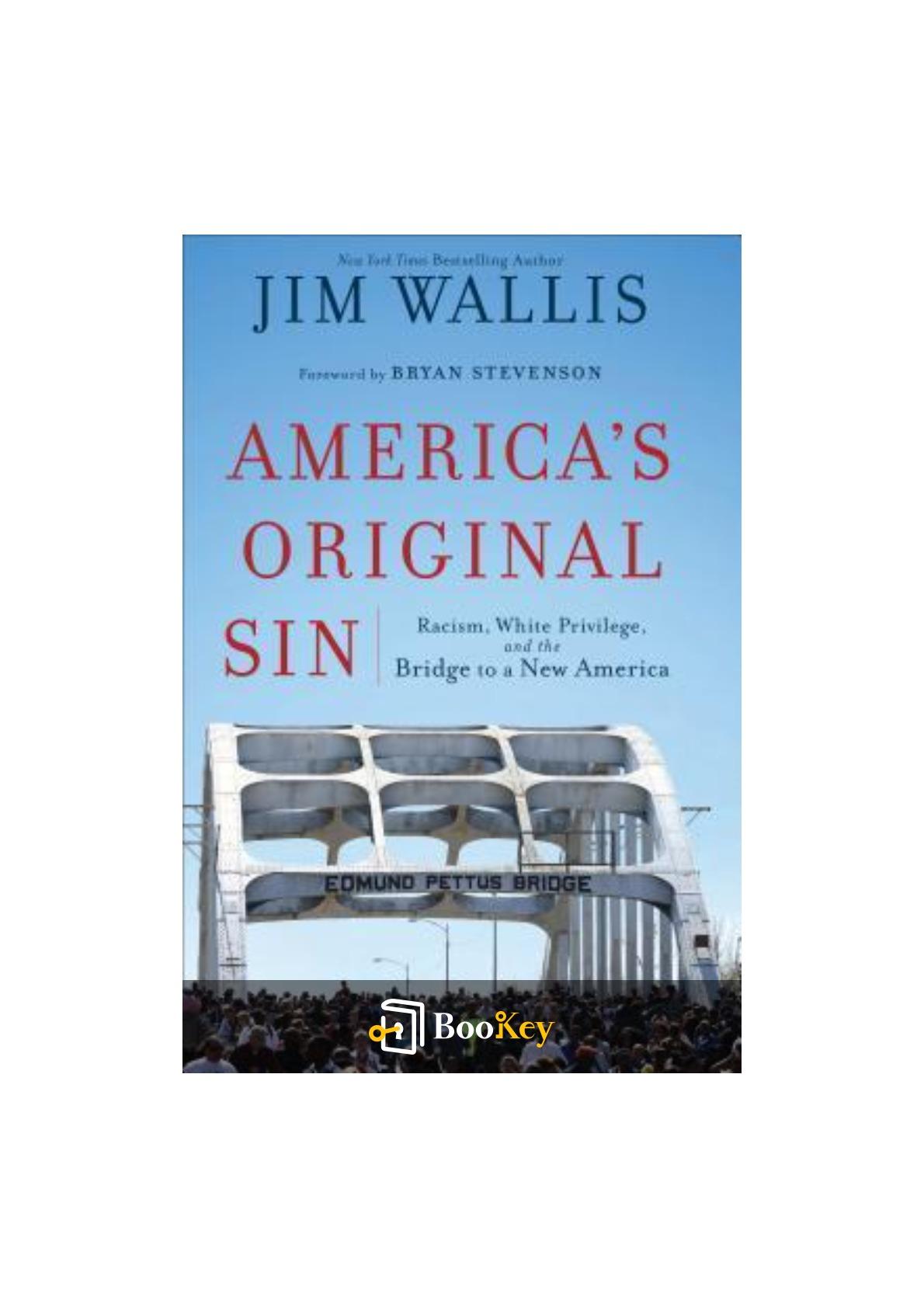

Summary of "America's Original Sin" by Jim
Wallis
Racism, White Privilege, and the Bridge to a New America
Written by Bookey
Check more about America's Original Sin Summary

BOOKEY APP
1000+ Book Summaries to empower your mind
1M+ Quotes to motivate your soul Scan






About the book
Check more about America's Original Sin Summary
In "America's Original Sin," renowned theologian and social activist Jim Wallis delves into an uncomfortable truth that has long plagued our nation: racism. With unflinching honesty, Wallis argues that racism is not merely a stain on America's history but an ongoing systemic problem deeply embedded within our institutions and hearts. Drawing on his own experiences, powerful stories, and historical perspectives, Wallis challenges readers to confront their own complicity in perpetuating racial injustice and offers a profound call to action towards racial healing and reconciliation. In a time when racial tensions continue to divide our society, "America's Original Sin" serves as a poignant and necessary reminder that true freedom and justice can only be achieved once we confront and dismantle the sins of our past.
About the author
Check more about America's Original Sin Summary
Jim Wallis is a Christian writer, speaker, and activist renowned for his humanitarian contributions and his unwavering commitment to social justice. As the founder and president of Sojourners, a progressive Christian magazine, Wallis has dedicated his life to bridging the gap between faith and social activism. A renowned theologian and best-selling author, he has emerged as a prominent voice within both religious and secular communities, advocating for change and reconciliation. With boundless compassion and a deep understanding of the societal structures that perpetuate injustice, Wallis continues to challenge and inspire individuals both within and beyond the realms of religion, aiming to heal America from its original sin of racism and inequality.
Chapter 1:Overview
Check more about America's Original Sin Summary
Hi,Welcome to Bookey! Today we will unlock the book America's Original Sin by Jim Wallis.
In the United States, a country often celebrated for its ideals of freedom, liberty, and equality, there remains a deep-rooted sin that still haunts the nation today. A sin that cripples communities, perpetuates inequality, and tarnishes the shared dream of a just society. It is a sin that is often overlooked, dismissed, or denied by those in positions of power. However, in his groundbreaking book "America's Original Sin," Jim Wallis fearlessly confronts this sin head-on, unmasking the systemic racism that has plagued the country since its inception.
One powerful example that Wallis highlights is the ongoing issue of mass incarceration in the United States. He draws attention to the fact that African Americans make up a disproportionate percentage of the prison population, despite being
a minority in the overall population. This glaring disparity cannot be explained away by mere coincidence or individual choices; rather, it is reflective of a deeply ingrained racial bias within the criminal justice system.
Through meticulously researched data and personal stories, Wallis reveals how the War on Drugs, which was launched in the 1970s, disproportionately targeted minority communities. Law enforcement agencies, propelled by racialized stereotypes and biased policies, have been complicit in the over-policing and harsh sentencing of black and brown individuals. The impact of this systemic racism is not limited to the individuals imprisoned but reverberates throughout their families and communities, perpetuating a cycle of poverty, despair, and racial inequality.
What makes Wallis's analysis so compelling is his ability to connect history with the present, demonstrating how the legacy of slavery and
racial discrimination continues to shape the prevailing attitudes and structures of society. He illuminates how practices such as redlining, where predominantly black neighborhoods were systematically denied access to affordable housing and economic opportunities, have perpetuated racial segregation and economic disparities.
Furthermore, Wallis presents a compelling argument for the need to reckon with this original sin if the United States truly wishes to live up to its professed ideals. He calls on individuals, faith communities, and the nation as a whole to engage in honest and uncomfortable conversations about race and racism. Recognizing the deeply embedded nature of this sin, he advocates for a collective repentance that goes beyond mere symbolism and performs the transformative work of dismantling racist structures, policies, and attitudes.
"America's Original Sin" is not just a book; it is a rallying call to action. It provides a roadmap
for how individuals and communities can begin the difficult but necessary work of racial reconciliation and justice. Wallis challenges us to examine our own complicity in upholding this sin and encourages us to move beyond guilt or indifference towards a determined pursuit of a more equitable and inclusive society.
In the following full Summary of "America's Original Sin," we will delve deeper into Wallis's analysis, exploring the key themes and arguments he presents throughout the book. We will examine his powerful plea for a collective acknowledgment of this sin, his vision for a nation reconciled, and the steps he outlines for achieving true racial justice. Prepare to be challenged, inspired, and called to action as we embark on this transformative journey together.
In the upcoming text, we will examine the top three significant concepts presented in this book.
1. America's history is deeply rooted in the sin of
racism and confronting this reality is crucial for true healing and justice.
2. Acknowledging and repenting for America's original sin requires dismantling systemic racism and working towards racial equity in all spheres of society.
3. Love, compassion, and a commitment to justice are essential in the journey towards racial reconciliation and creating a more just and inclusive America.
Chapter 2:America's history is
deeply rooted in the sin of racism and confronting this reality is crucial for true healing and justice.
Check more about America's Original Sin Summary
Wallis emphasizes the importance of not only recognizing the individual acts of racism but also understanding the systemic and institutionalized nature of the problem. He argues that racism is not simply limited to a few prejudiced individuals, but rather a deeply ingrained societal issue that must be addressed on multiple levels.
Another key point Wallis makes is the need for racial reconciliation in America. He believes that healing can only occur through honest and open dialogue between different racial groups. Wallis encourages white Americans to acknowledge their privilege and actively work towards dismantling the systems that perpetuate racial inequality.
To illustrate the significance of racial reconciliation, Wallis shares stories of individuals who have devoted their lives to fighting racism and advocating for justice. One such individual is Bryan Stevenson, the founder of the Equal Justice Initiative, who works tirelessly to challenge racial inequities in the criminal justice system. Wallis explains how Stevenson's work not only addresses the injustices of the past but also seeks to create a more equitable future for all Americans.
Moreover, Wallis recognizes the importance of faith in the fight against racism. He draws upon biblical teachings to argue that racism is a sin that goes against the principles of love, justice, and equality. He calls on religious communities to actively engage in combating racism and promoting racial reconciliation.
One compelling example that Wallis provides is the story of the Charleston shooting in 2015. He recounts the tragic event where nine African American churchgoers were killed by a white
supremacist. Wallis explores the response of the victims' families, who displayed an incredible act of forgiveness and grace towards the perpetrator. He argues that their response exemplified the power of love and forgiveness in the face of deep-rooted racism.
In conclusion, "America's Original Sin" by Jim Wallis delves into the history of racism in America and stresses the need for healing and justice. Through detailed examples, Wallis examines the economic, social, and psychological impacts of racism on Black Americans and highlights the role of institutions and individuals in perpetuating racial inequalities. He calls for racial reconciliation, recognizing the importance of open dialogue, the acknowledgement of privilege, and the pursuit of justice. By confronting the harsh realities of America's racist history, Wallis presents a compelling argument for a future free from the sin of racism.

BOOKEY APP
1000+ Book Summaries to empower your mind
1M+ Quotes to motivate your soul Scan






